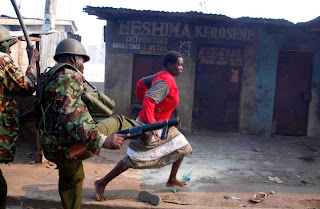Thursday, January 31, 2013
Boniface Mwangi: From Street Photography to the World Stage.
Boniface Mwangi, a self-taught Kenyan photographer who risked his life to capture shocking images of Nairobi’s post-election violence in 2007-2008, has been honored with the prestigious Prince Claus Foundation award. Mwangi started making a name for his social-political activism under the banner, Kenya Ni Kwetu (Kenya is our Home) and is popular for his stunning images on the post-election violence that hit Kenya in 2007-2008. He is also the founder of Picha Mtaani.
Born on July 10, 1983, Mwangi, then 17, reviewed his life and decided he had to change his ways if he was to survive the vicissitudes of life when his mother died in 2000.
He joined a Bible school and secured a diploma in Bible Studies. It was while at the school that he would discover he had an interest in photography. One of his teachers, having noticed Mwangi’s interest in photography, gave him two texts that would alter the direction of his life. These were the biographies of Mohamed Amin, the Kenyan photographer hailed as one of the greatest photojournalists of the 20th century.
Mwangi joined the East African School of Journalism, he was studying in the morning while rushing back to the streets to sell books in the streets at night so that he could pay his fees. The school had no cameras to train students and the photography class was a mere two hours of theory class twice a week. He hired a camera and started practicing what he learned in class. He focused his work on the poverty and the deprivation in Kenyan slums, the resilience of the vendors on the streets, the brutality of policemen and women on ordinary citizens.
Mwangi started contributing to The Standard newspaper on a freelance level before he eventually secured employment at the newspaper, which is the oldest newspaper in Kenya.
The next few years were productive for Mwangi; he tracked a police crackdown on the unlawful gang, Mungiki, winning his first, and Kenya’s CNN African Photojournalist of the Year Award in 2008.
In the event, the Mungiki pictures proved to be only a dress rehearsal for the chaos that followed in the aftermath of the disputed Kenyan presidential election, 2007. Gang warfare in the slums, as well as their clashes with the police – with innocent Kenyans caught in the crossfire – transformed the impoverished hamlets into rivers of blood. Mwangi captured the horrific scenes on film, as well as the pogrom in other restive parts caught in post-poll mayhem.
The images shocked and troubled the world, from Europe to North America, where leading media houses splashed Mwangi’s images. Mwangi’s own newspaper used his images selectively, a form of self-censorship that motivated Mwangi’s next course of action.
Mwangi has won several awards including the prestigious CNN Multichoice African Journalist Awards for Photography on two occasions.
The prize Prince Claus Foundation award was delivered to Boniface Mwangi along with 10 other prizewinners in Amsterdam, Netherlands this week.
Subscribe to:
Post Comments (Atom)












No comments:
Post a Comment